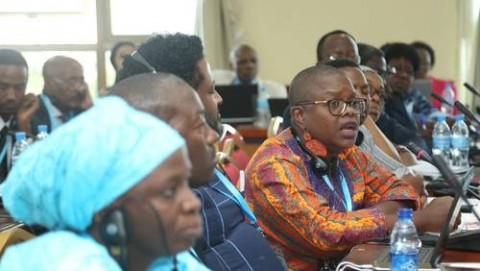
GCED Basic Search Form
Quick Search
You are here
News

UNESCO Offices in Africa (UNESCO Dakar, in close collaboration with UNESCO Regional Office in Eastern Africa and UNESCO Dar es Salaam) joined forces to organize the Regional Capacity Building Workshop on Alignment between Curriculum, Teacher Training and Learning Assessments, in Dar es Salaam, United Republic of Tanzania, from 25 to 27 July 2018.
The workshop, financed by the Global Partnership for Education and UNESCO, in support of TALENT spearheaded by the Dakar regional office, saw the presence of education experts from 17 African countries (Benin, Burkina-Faso, Burundi, Cameroon, Central African Republic, Chad, Ethiopia, Gambia, Lesotho, Liberia, Malawi, Mali, Niger, Senegal, South Sudan, Tanzania (including Zanzibar) and Uganda.
National teams, comprising of heads of curriculum design, teacher training and learning assessments from the sub-Saharan countries attended the three-day workshop aimed to strengthen the capacities of national delegates to address alignment of national curriculum, teacher training and learning assessment .
The workshop was officiated by the Deputy Permanent Secretary in the Ministry of Education, Science and Technology (MoEST), Dr. Ave Maria Semakafu. In her opening statement, she reiterated the impact of mother-tongue language in promoting provision of quality education. She said, “African countries have been keen in using colonial languages as medium of instruction at different levels in their education systems which has led to poor educational standards”.
The Director of the UNESCO Regional Office for Eastern Africa, Ms. Ann Therese Ndong-Jatta, commended UNESCO Dakar office for the organization of this important workshop. She acknowledged the support of the Global Partnership of Education (GPE) to the TALENT action programme for addressing some of the needs for strengthening the National Learning Assessment Systems of Sub-Saharan African countries.
Recent data from the UNESCO Institute for Statistics (UIS) indicate that Sub-Saharan Africa has the single largest number – 202 million – of children and adolescents who are not learning. Estimates based on past trends suggest that across the region, nearly nine out of ten kids between the ages of about 6 and 14 will not meet minimum proficiency levels in reading and mathematics by the time they are of age to complete primary and lower secondary education. According to UIS, this learning crisis could threaten progress towards the Sustainable Development Goals (SDGs).
The regional workshop addressed the issue of poor education quality from the perspective of the extent to which learning assessment, learning goals, standards, curriculum and pre- and in- service teacher training are all aligned and concur to form a coherent system that foster effective learning. The workshop was hosted by the Open University of Tanzania (OUT) and facilitated by a team of experts from UNESCO and OUT. Plans are underway to design a long-term course on alignment of curriculum, teacher training and learning assessments to be built upon the results of the regional workshop.
In addition to the envisaged future long-term course, the TALENT Regional workshop will be followed by online training for eight weeks aiming to identify weaknesses in the curriculum development in African countries and learn new approaches to improve the processes and practices towards provision of quality education for all.
The TALENT Regional Capacity building workshop on alignment between curriculum, teacher training and learning assessments is an important step toward ensuring the provision of quality education in a holistic manner by active and coherent involvement of the three vital pillars in education, i.e. curriculum, teacher education and learning assessment.
Through the workshop, participants were able to identify main weaknesses in their respective learning assessment systems (at basic and/or secondary education levels), and learn from best practices in learning assessment system alignment with curriculum and teacher training.
All the participating countries developed a national work plan and roadmap to improve the alignment of the learning assessment system in their country, which should be improved further and submitted to the workshop facilitators. Furthermore, the participants were introduced and registered to Moodle Platform supported by OUT, which will enable them to continue collaboration and participation in the additional eight weeks training on the same. This network will also give an opportunity to the group of practitioners, experts and education cooperation institutions to share further their experiences and expertise.
URL:
